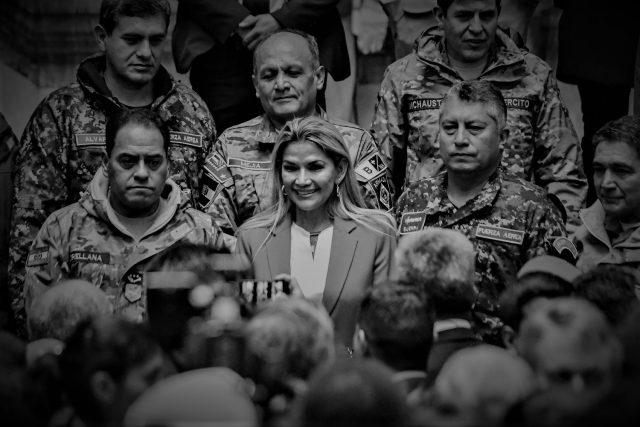The first trial against the self-proclaimed former president of Bolivia, Jeanine Áñez, will begin this Thursday in the midst of wide political expectations, as she is accused of crimes for which the Prosecutor’s Office has requested the maximum sentence of 10 years.
On the eve of the trial, Áñez began a hunger strike that was announced by her daughter Carolina Ribera, who read a letter in which the accused assures that she is ill and that she will be prosecuted «in a country without justice or law».
This trial has been baptized in the South American country as ‘Coup d’etat II’, and in which the former senator is accused of breach of duties and resolutions contrary to the Constitution for having assumed the presidency on November 12, 2019 without meeting the necessary institutional requirements measures, just a couple of days after former President Evo Morales was forced to resign.
Among the multiple anomalies cited by the Prosecutor’s Office, the fact that Áñez put on the presidential sash in a Senate session that did not have the necessary quorum to validate the ceremony stands out, explains journalist Cecilia González for RT.
In addition, given the forced resignation of Morales, the interim presidency should fall to a legislator from the ruling Movement for Socialism (MAS), since they had a majority of seats, and not to the opposition bloc of which Áñez was a member.
During the trial, the participation of politicians, police officers, soldiers and people from the civil society who organized an irregular presidential succession will also be analyzed.
For this reason, together with Áñez, the former Chief of Staff Flavio Gustavo Arce will be tried; and former commanders Pastor Mendieta (Army), Gonzalo Terceros (Air Force) and Palmiro Jarjury (Armed Forces).
They are joined by two fugitives: former Police Commander Yuri Calderón and former Armed Forces Commander Williams Kaliman.
Arrest and court cases in Bolivia
Áñez, who governed for a year, starting in November 2019, was arrested in March 2021, just five months after Luis Arce, the MAS candidate, won the presidency in elections that represented the return of democracy in Bolivia. .
Since then, there are two major court cases against her. One is the so-called ‘Coup d’etat I’, in which she is charged with the crimes of sedition, terrorism and conspiracy, and which is ongoing but has not yet come to trial; and ‘Coup d’état II’, which begins this Thursday.
Along with her participation in the overthrow of Morales and her anomalous inauguration as president, other cases are also being investigated for crimes against humanity related to the Sacaba and Senkata massacres carried out by the security and military forces under her charge during the first days of her government, and that left a balance of at least 38 people assassinated and hundreds more wounded.
Since she was detained in the Miraflores prison, located in La Paz, Áñez declared herself a political prisoner and demanded house arrest on several occasions, considering that she was a victim of institutional violence. However, the Bolivian authorities rejected her requests.
Neither was she supported by the Inter-American Commission on Human Rights (IACHR), an organization that, at the end of last year, rejected the precautionary measures filed by the former ‘president’.
With a view to the start of the trial, one of her lawyers, Alain de Canedo Ostria, has already anticipated six observations to challenge the process, for example, because only one of the three judges that make up the court signed the order to start a process that the accused considered unusually fast.
“It is a hasty accusation. It is a hasty investigation, with only the elements of charge in favor of the Government”, the lawyer told the newspaper Página Siete.
He also challenged that officials have unduly intervened in the case, since the Minister of Government, Eduardo del Castillo, was the one who announced the start of the trial, which corresponded to a court; while the Minister of Justice, Iván Lima, warned that she could be sentenced to 12 years in prison. Both also anticipated that the trial would be brief.
The arguments of the defense
Áñez has directly discredited the investigations. Without ever acknowledging the coup d’état, she insisted that the only intention is to «erase the history» of Morales’ «fraud» to carry out an «illegal trial» against «defenders of democracy, justice and freedom.» ».
She added that what is currently happening in Bolivia seems to be from «a medieval and totalitarian era» and with «political prisoners», a condition that has not been recognized by any national or international organization.
Beyond the statements, the secretary general of the State Attorney General’s Office, Edwin Quispe, reported that the prosecutors’ commission presented the formal accusation against Áñez based on more than 70 pieces of evidence and more than 20 witnesses.
On the other hand, 21 former right-wing presidents from Latin America and Spain reiterated their support for Áñez, considering that her arrest in Bolivia is arbitrary.
«The former president has the right to enjoy a free trial, due process and effective judicial protection», they said in a letter that is signed, among others, by former presidents Mauricio Macri (Argentina); Álvaro Uribe and Andrés Pastrana (Colombia), José María Aznar (Spain); and Vicente Fox and Felipe Calderón (Mexico).


